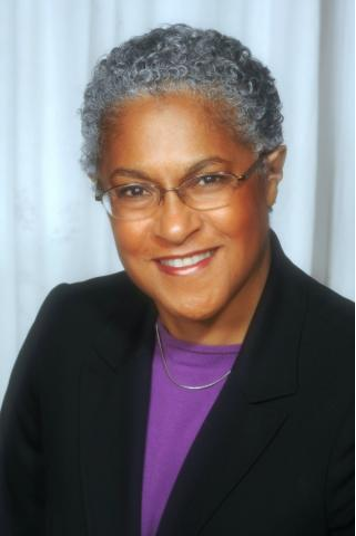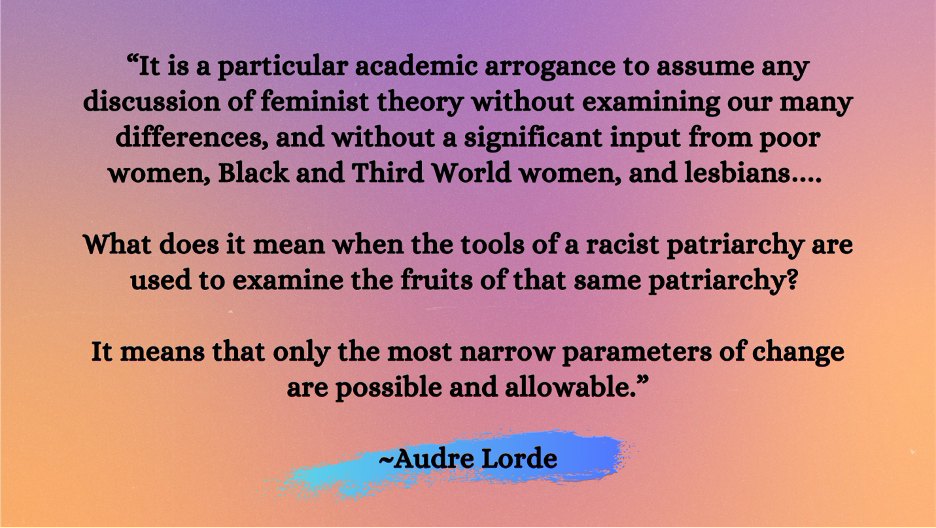Hi! We’re Libby Smith, Kathleen Doll, and Vidhya Shanker. Join us on a walk down memory lane to November 2019…
An editorial trio of white women evaluators (including Libby and Kathleen) set out to publish a journal volume on intersectionality—a term that originated in Black Feminist Thought and among queer women of color. This group embarked on its quest without Black women—or any women of color or indigenous women. Instead, they hand-picked a few Black/ Indigenous/ Women Of Color (BIWOC) to contribute pieces for its consideration (including Vidhya). As such, the group exploited the intellectual labor of Black feminists. Moreover, while we are all inherently intersectional, the white women performed diversity and inclusion while retaining power and control over both process and product, fully convinced they were qualified to assess work that BIWOC wrote from an intersectional lens.

Sociologist Dr. Patricia Hill Collins documented centuries of
Black Feminist Thought in 1990, contemporaneously with Kimberlé
Crenshaw’s earliest legal scholarship on intersectionality
This scenario is not unique and illustrates the failures of the field of evaluation to root itself in the experiences, scholarship, and activism of intersectionally oppressed groups. The field’s lack of theoretical or analytical understanding of difference, identity, and oppression played out as white evaluators who identify as feminists reinforced precisely the patterns of exploitation and exclusion they believe they are fighting, illustrating how relations of dominance and subordination are woven into business-as-usual—even among those who experience and resist systems of oppression.

Lesson Learned: In hindsight, it is painfully obvious tothe trio that they were guilty of the academic arrogance that Audre Lorde’s quote describes. In scenarios like this, which are common, it takes a collective effort—solidarity—among BIWOC to refuse to feel flattered at being hand-picked; to withhold contributing unless/ until the effort is led by Black women, indigenous women, and women who are refugees of U.S. imperial wars; and to shake up the racist, patriarchal concentration of power that white women often perpetuate. Fortunately, that’s what happened in this scenario (shout-out to Vidhya!).
From this inflection point, a path toward solidarity, grounded in intersectionality, within and between BIWOC and white women emerged. A collective of over 60 feminist evaluators—BIWOC and white—are now poised to answer:
- What happens when BIPOC women, the global majority, claim authority of the discourse of feminist evaluation?
- What happens when white women relinquish control over that discourse?
This upcoming week of blogs highlights some of the work that has emerged from this experience. The blogs are aimed at engaging readers in re-shaping the generation of knowledge through interdependence and co-creation rather than oppressive habits that we all, regardless of phenotype or identity, have inevitably internalized. We invite readers to imagine new structures, grounded in intersectionality, that create possibilities for solidarity and collective action.
Hot Tip: Join this work! If you want to learn more about tuning in for our monthly meeting, reach out to any one of us via email (smithlib@uwstout.edu; kathleendoll101@gmail.com; shan0133@umn.edu).
Rad Resource: Cite Black Women
The American Evaluation Association is celebrating Feminist Issues in Evaluation (FIE) TIG Week with our colleagues in the FIE Topical Interest Group. The contributions all this week to aea365 come from our FIE TIG members. Do you have questions, concerns, kudos, or content to extend this aea365 contribution? Please add them in the comments section for this post on the aea365 webpage so that we may enrich our community of practice. Would you like to submit an aea365 Tip? Please send a note of interest to aea365@eval.org. aea365 is sponsored by the American Evaluation Association and provides a Tip-a-Day by and for evaluators.
